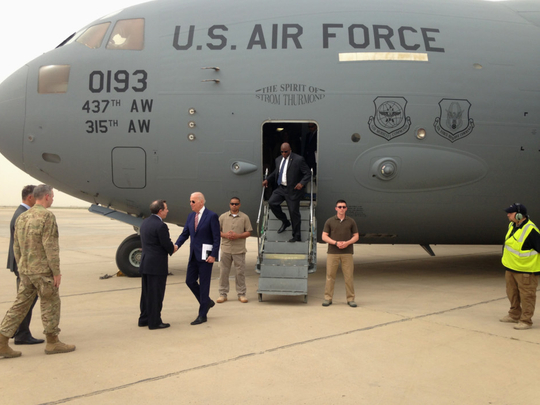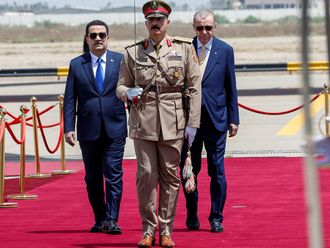
Baghdad: Vice President Joe Biden arrived here Thursday at a moment of intense political turmoil for Iraq and its prime minister, who is fighting to hold onto his office amid a paralysing political crisis, a weakened economy, and a grinding war against Daesh.
Biden’s trip, kept secret before his arrival, is his first to the country since late 2011, when he came to Baghdad to mark the withdrawal of the last American troops from the country. He arrived around midday aboard a military cargo plane and was slated for a full day of meetings with Iraqi leaders.
Senior White House officials have touted the recent success of Iraqi forces, backed by US airpower and advisers, in driving Daesh from territory that the group seized last summer.
“Militarily the momentum is just clearly in the coalition’s favour against ISIL {Daesh),” said a senior administration official. “They haven’t had a major military victory in more than a year.”
The growing worry is that the political chaos in Iraq could begin to undermine the battlefield momentum, said the administration official, who was granted anonymity to preview Biden’s unannounced visit.
Biden’s trip to Iraq was planned within the last two months, before the political crisis exploded in Baghdad, but the timing of his visit couldn’t be more opportune for the US.
The crisis began when Iraqi Prime Minister Haider Al Abadi, who has the strong support of the Obama administration, made a bold push recently to replace politically connected members of his cabinet with a new slate of technocrats and reformers. Al Abadi characterised the move as part of a broader plan to stamp out corruption amid the country’s budget crisis caused by plunging oil prices.
When his efforts faltered, thousands of protesters gathered at the gates of Baghdad’s heavily fortified Green Zone and threatened to storm parliament.
“Now is not the time for government gridlock or bickering,” President Obama said last week in Saudi Arabia about the protests. Asked about Al Abadi’s hold on power, Obama described the prime minister as a “good partner” and said he was “concerned.”
The concern over Iraq has led to a flurry of visits and promises from top administration officials in recent days and weeks, including both the secretary of state and secretary of defence. In separate trips, they offered more American aid, more military advisers and firepower.
Biden is the highest ranking visit US official to visit Iraq since his last trip to the country in 2011 and is a sign of the administration’s commitment to Al Abadi and his government. “There can be no greater symbol of how much support he gives to the Iraqi government in general and how much faith we have in Prime Minister Al Abadi than the vice president of the United States showing up in Baghdad,” said the senior administration official of Biden’s visit to Baghdad.
Obama, meanwhile, has said that his top foreign policy priority during his final months in office is ensuring that Daesh is on the path to defeat.
One major goal for Biden will be to work with Iraqi leaders to prevent the country’s political problems from derailing Iraq’s military operations against Daesh.
Recently, Al Abadi, concerned about the protests in Baghdad, called a contingent of elite Iraqi counterterrorism troops back to the capital from Hit, where they were fighting Daesh forces. As the situation in Baghdad calmed, those fighters returned to the fight and Iraqi troops have largely liberated the city.
“The more the political system in Baghdad is consumed with everyone keeping their job,” the senior administration official said, “the more difficult it is for them to all get together” in the fight against the Daesh.
US fighter jets, attack helicopters and a growing contingent of about 5,000 US troops, are supporting the Iraqis in the fight and senior Obama administration officials have said they would like to see the Iraqis drive Daesh from its stronghold in Mosul, Iraq’s second largest city, before the end of the year. And Obama has described such a possibility in hopeful, but hedging, terms.
“My expectation is that by the end of the year, we will have created the conditions whereby Mosul will eventually fall,” he said in a recent interview with CBS News.
The political chaos in Baghdad has made the already complicated politics of planning for such an offensive into treacherous urban terrain even harder. “Mosul is a multi-ethnic, multi-sectarian place,” said the senior administration official. “It is very important that Iraqis decide on a clear plan ... What you don’t want is a race to Mosul from a bunch of different forces that end up getting in each other’s way or clashing with each other.”
Even as Iraqi forces have wrested ground away from Daesh, the Iraqi government has struggled to bring in badly-needed humanitarian and reconstruction assistance to liberated areas.
Last week Obama told America’s Gulf Arab allies to hold off contributing aid, which is desperately needed to stabilise liberated areas, until Iraq’s political crisis calmed. “What I recommended was that we wait to assess how the current government turmoil in Iraq plays itself out over the next couple of weeks before we make final decisions about how useful particular offers of such assistance will be,” Obama told reporters in Saudi Arabia last week.
In areas that are currently under the control of Daesh, such as Fallujah, there are reports of massive food shortages and single bags of flour selling for as much as $750 (Dh2,755). Before leaving a city, Daesh fighters will typically seed it with bombs, which are placed in refrigerators, bedrooms and bathrooms.
Biden’s visit to Iraq is a sign of the administration’s determination to defuse Iraq’s latest political crisis and maintain the military momentum in the fight against Daesh.
The vice president, who was handed the Iraqi portfolio by Obama in 2009, has remained immersed in the country’s political, ethnic and sectarian struggles for much of the last seven years. Biden’s son Beau, who died last year, served in Iraq during the height of the American occupation.
And no White House official has forged a closer relationship with Al Abadi than Biden, who joked last summer that he and the prime minister “have probably spent more time on the phone than I have with my wife.”
In the last few days there have been some signs that the political crisis surrounding Al Abadi is stabilising. In a chaotic session earlier this week that included scuffles and the evacuation of women and children from the chamber, Iraq’s parliament approved Al Abadi’s request to replace six of his 22 cabinet ministers. The thousands of anticorruption protesters, who massed outside the Green Zone where parliament meets, have remained peaceful.
Al Abadi’s partial moves won the approval of cleric Moqtada Al-Sadr who led the Shiite resistance to the American occupation before 2011 and has now become an anticorruption crusader. But Sadr warned he wasn’t satisfied and suggested that unless more changes were forthcoming, he and supporters would return to the streets. “It’s been a dramatic couple of weeks,” said the senior administration official of the unrest, “and the drama is not over.”











